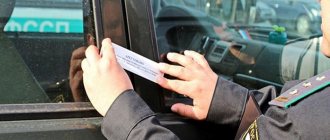The legislation of the Russian Federation provides for various methods of collecting funds from persons with financial debts in various areas. One of the means of debt recovery is the involvement of bailiffs, who are authorized to seize accounts and write off funds from them. To ensure your own financial stability and legal protection of personal funds, you need to know whether the bailiff has the right to withdraw money from the account without notice, and what to do if the bailiffs illegally wrote off money from the account.
What to do if bailiffs have withdrawn money from your card
The rights and responsibilities of bailiffs under the legislation of the Russian Federation have been significantly expanded. If there are legal grounds, they can not only look for all sources of income to collect debts, but directly withdraw funds from the cards.
In order to simplify the enforcement procedure, all stages of debt collection can currently take place electronically: from submitting documents to the court to writing off money. The citizen must be notified of such legal proceedings. However, in practice, some conflicts arise: money is written off in violation of the notification procedure, sometimes repeatedly or without any legal grounds at all. To protect yourself, you should carefully read all the details of this legal practice and what you can do to protect your interests.
How to return illegally withdrawn money
To figure out whether it is possible to return written-off funds in a situation where this happened illegally, you should rely on the fact that all the powers of the bailiff are in strict accordance with the current legislation of the Russian Federation. Therefore, any step that contradicts at least one norm of law is subject to appeal in court.
The most common violations when bailiffs perform their duties are:
- receiving information from banking institutions only about the availability of certain funds without information about their intended purpose, which may lead to the withdrawal of funds that cannot be used to collect debts according to the law;
- debits from the card are carried out in the following order: first to the FSSP account, and only then to the accounts of the creditor; during the procedure, delays in transfers may occur, which leads to repeated withdrawals of funds;
- For various reasons, notification of the commencement of legal proceedings was not received, which is why the write-off of money comes as a complete surprise.
To return funds that were withdrawn without legal grounds, you must send a corresponding application to the head of the FSSP department. It indicates the applicant’s full name, his passport and contact details, the number of the enforcement proceedings, and the facts confirming the illegal withdrawal. All supporting documents are attached to the application, such as a certificate of the purpose of the funds received, an extract of the fine already paid, etc.
The document is submitted in 2 copies. The official accepting the application is required to sign it. If there are sufficient facts of illegal withdrawal of funds, the bailiff’s response order indicating the return of funds, canceling the previously issued collection order must be issued within 7 working days.
Note!
If, in the presence and confirmation of facts of violation of the law, the bailiffs refuse to return the collected money voluntarily, it will be necessary to contact the court at the place of registration of the bailiff service department with a corresponding statement of claim. In addition to the withdrawn amount, you can also indicate other claims, such as damages caused: compensation for moral damage or legal expenses.
What should I do in case of illegal withdrawal of money from my account?
You should not panic and become depressed, but develop a clear plan of your actions. In order for the effect of the chosen measures to be maximum, it is worth finding answers to the following questions:
- When exactly were the funds debited from the account? You need to know the month, day, time. An SMS notification, which most banks provide, can help with this.
If there is no such service, then you can make a printout of all account transactions via Internet banking. This will take a couple of minutes, but the resulting report will display all transactions with a clear indication of time and date.
- After clarifying the date and time of debiting, it is worth deciding on the location of your card at the moment when the illegal withdrawal of money from the account occurred. You also need to remember where you were too. This is easiest to do if very little time has passed since the unpleasant incident with the card. And if the client comes to his senses after a few days, then it will be much more difficult to restore the chronology of events.
- It is worth finding out how the money was written off: through an ATM, transfer, payment for goods in a store or when purchasing online. It happens that no one stole the money , but due to a system error, payment for some product in the store - the payment could go through twice. If such a case is detected, the bank will be able to cancel the transaction.
The method of writing off funds will help operational employees reduce the time spent searching for the criminal, if there was one. You can also find out how the money was withdrawn using your current account statement.
- It is also worth finding out whether the rules for using a bank card were violated at all. Often people trust their cards to their relatives or friends, and then complain about illegal withdrawal of money, while friends or relatives used the funds. To prevent such incidents from happening, do not forget about precautions.
It is necessary to clarify all these nuances, first of all, in order not to get into trouble and not to make your loved ones guilty. If, having found the answers to all these questions, only one option remains probable: that the money was stolen, then you need to act immediately.
Where can funds be debited from?
The law allows bailiffs, in carrying out their official duties, to directly cooperate with tax authorities and credit institutions in order to obtain reliable information about the availability of financial resources of citizens in whose case judicial proceedings are being conducted. They can obtain information about the availability of funds in the bank, the balance of funds in the account, etc. Financial organizations are required to provide this information to bailiffs; otherwise, significant penalties may be imposed on them.
In accordance with the Federal Law of the Russian Federation “On Enforcement Proceedings,” financial funds can be recovered from the following accounts:
- salary cards;
- debit cards;
- credit cards;
- electronic wallets;
- stock accounts.
Note!
Collection of money from a salary card cannot exceed fifty percent of the amount of monthly charges. If a one-time withdrawal does not fully cover the amount of debt obligations, then payments can be withdrawn monthly until the full amount of debt obligations is repaid.
Also, when proving in court his difficult financial situation, every citizen can count on a reduction in the percentage of monthly collections, sometimes the reduction can be more than 30 percent.
On the other hand, in this bill there are fixed incomes that are not subject to recovery, here are some of them:
- alimony payments;
- funds that compensate for damage caused to health;
- social benefits;
- survivor benefits;
- one-time financial assistance;
- payment for the burial of the deceased;
- child benefits, etc.
If the translation was wrong
On the Internet there are many shops and individual sellers, joint purchases, one-page sites that sell goods at low prices. As a rule, the owners of such companies ask to pay for purchases directly using plastic cards. The most common type of plastic is the Sberbank instant card. This card belongs to the Maestro payment system and is issued free of charge. In addition, the plastic is not personalized, which means it becomes more difficult to identify the owner.
There are many ways to cheat
There are a large number of services on the Internet to help transfer funds, sell online applications, etc. Some applications automatically withdraw money from your plastic card without confirmation . For example, negative reviews about the Tekka application indicate that tekka digital sa withdrew money when you visited their website.
The Internet is accessible to everyone, and creating mini-firms and one-page websites takes no more than 10 minutes. All this contributed to the spread of scams. The scheme is very simple: the client transfers funds to the card, but does not receive the goods. In this case, in order to get a refund, you must remember that there are reasons why the payment itself may initially be considered erroneous:
- if the owner of the plastic proves that he made an unintentional typo in the details;
- if the funds were written off by a fraudster;
- if the funds were debited via automatic payment.
Of course, all data must be confirmed not only by the client’s words. Screenshots of correspondence from social networks and account statements about the transfer of funds are suitable for confirmation. In general, bank employees testify that the only way to fully return money to the account is the voluntary return of it by the owner. At the same time, the bank does not have the right to disclose the recipient’s details to the person who transferred the money.
In the above situations, the borrower can hope for an urgent refund. But there are situations when the bank does not return funds even if there is certain evidence:
- if an advance payment was made, but there was no transaction;
- if the client voluntarily sent money;
- if the payment was a regular installment on a credit card.
Thus, if the client himself transferred the funds, then it is almost impossible to prove that the work was not done. The same applies to the advance payment made for the performance of work or services. And if the client transferred money and it was spent on paying a loan from a third party, then the bank also does not have the right to return it back.
In general, based on the practice of working with banks and the experience of clients, it can be noted that money is returned to those clients who show persistence and perseverance. To get your money back as quickly as possible, you must submit your application on the day the fraudulent scheme is discovered.
If the payment has already been completed, but in your personal account in online banking its status has not yet changed to “Completed” (this happens at night or during peak hours), then in this case you can cancel the payment yourself.
You need to pay for goods only on verified sites
Why was the money written off?
In order to obtain information about why funds were collected from the current account, you will need to contact the bank for a statement of debiting funds, which indicates data on the enforcement proceedings on the basis of which the collection occurred.
After this, it will be possible, by indicating your data, on the official website of the FSSP, to obtain information about the number of the enforcement proceedings, the address of the department where the case is located, and the name of the bailiff who was in charge of it.
To prevent money being written off as an unpleasant surprise, you can protect yourself as follows:
- check, based on personal data, the presence of open proceedings on the official website of the FSSP;
- regularly check e-mail and municipal mail;
- keep records of cash receipts on the card;
- save financial documents confirming payments and transactions;
- receive and make payments in cash.
Where to go and how to write an application
When figuring out what to do if a VTB ATM does not dispense money, you must first of all stay at the broken terminal. This is due to the fact that when such an error occurs, devices often issue cash. But this happens with a slight delay. If the device used was located on the territory of a bank branch, you must call an employee and follow his instructions.
When an ATM located far from a branch of a financial institution has debited funds from your account but has not issued them, it is advisable to contact the hotline of the bank that owns the device and report the problem.
When using an ATM or terminal, you must take a receipt
The citizen’s appeal will be registered and, if the information that Alfa Bank has written off money from his account is confirmed, the money will be refunded to his card.
If it is not possible to contact a hotline specialist, you should visit the nearest branch and make a request, following simple instructions:
- Write a statement containing a detailed description of the circumstances under which the error occurred. The client’s “plastic” number, time of operation, terminal location and withdrawal amount are indicated.
- Attach documentation that can confirm that the error occurred. For example, a check receipt, an official statement of transactions carried out on the account, as well as a copy of your passport.
- Indicate the account/card number through which the refund is required.
It is important to remember that such an appeal must be drawn up in two copies. Submitted personally by the card holder or his official representative. In the second option, a notarized power of attorney is required.
How does the bank confirm the error?
To confirm that funds were mistakenly debited from a Gazprombank card or a “plastic” card of any other financial organization, the bank carries out a multi-stage check. First of all, the faulty terminal is collected, after which the cash is recalculated. If their quantity does not match the information specified in the database, this may become the basis for a refund.
In addition, when a Sberbank ATM withdrew money from a card but did not issue it, the financial organization may not be limited to such funds and resort to alternative verification methods. Among them, CCTV footage is the most commonly used.
If the ATM does not dispense money, you need to contact the bank with a written statement
How long to wait for a refund
The timing of completing the verification and subsequent refund directly depends on the circumstances in which such a problem arose. It may take about 1 month to identify and verify a controversial transaction. However, if the transaction was interbank, the time frame for considering citizens’ claims may be doubled.
Moreover, according to current legislation, funds must be returned within 15 days. However, this norm is not widely observed by financial institutions.
Why might they not return the money?
If the bank is unable to identify the problematic transaction and refuses to reimburse the costs, the user should contact the police with a statement about illegal debiting of funds. In cases where such measures do not help to recover lost money, it is advisable to file a claim in court.
You should refer to Article 856 of the Civil Code. It allows the victim to claim not only compensation for illegally written off money, but also interest on their use. In addition, the law provides for the possibility of obtaining compensation for moral damage received.
The procedure for writing off funds from the card
There is a certain procedure for writing off funds from cards. To do this, bailiffs must initiate enforcement proceedings on the basis of the following judicial acts:
- court order;
- civil court decisions;
- resolution on an administrative offense;
- writ of execution in a criminal or civil case.
After the case is considered, copies of these court documents must be sent to all parties for review. The results of legal proceedings may be challenged in court. To do this, you will need to file an appeal with the same judicial body.
After the bailiff issues a decision on enforcement proceedings, a copy of the document must be sent by mail to the citizen in respect of whom it was carried out. From the moment the citizen receives the notification, and if it was not received from the date indicated in the expiration stamp of the returned notification, there is a five-day period to voluntarily repay the debt.
If during this time the decision was ignored, then, according to the law, bailiffs have a reasonable right to initiate a search for the bank accounts of persons in whose case proceedings were carried out. In addition, the bailiff can collect not only the amount of the fine, but also the enforcement fee.
How to qualify withdrawing money from someone else's bank card through an ATM
With the development of technology, social relations become more complex, and the emergence of new ways to illegally take possession of other people's property is inevitable. At the beginning of the last century, no one could have imagined that it was possible to steal all of a person’s money by simply taking away a plastic rectangle from him. With the advent of cashless money, this has become common.
At the same time, legislation is changing. An example of this is a separate paragraph of Article 158 of the Criminal Code of the Russian Federation, introduced in 2021: theft from a bank account, as well as in relation to electronic money. Previously, any illegal withdrawal of funds, including through an ATM, was classified, depending on the stolen amount, as theft in a significant amount (from 5,000 rubles), in a large amount (from 250,000 rubles) and in an especially large amount (from 1,000,000 rubles).
At the same time, in judicial practice there are disagreements regarding whether cases when a person illegally withdraws funds from someone else’s card through an ATM fall under paragraph “g” of Part 3 of Article 158 of the Criminal Code of the Russian Federation. So, for example, in a typical case related to withdrawing money from an ATM, the prosecutor asked to convict the person under Part 2 of Article 158 of the Criminal Code of the Russian Federation. He justified this by the fact that, by virtue of Art. 5 of the Federal Law of June 27, 2011 No. 161-FZ “On the National Payment System”, theft from a bank account can only take place in the case of non-cash and electronic funds through their transfer in non-cash form (appeal ruling of the Kirov Regional Court dated November 5, 2019 in case No. 22–2164). In a similar case, the verdict of the court of first instance was overturned, the actions of the convicted person were reclassified from paragraph “d”, part 3, article 158 of the Criminal Code of the Russian Federation to part 1, art. 158 of the Criminal Code of the Russian Federation (appeal ruling of the Court of the Jewish Autonomous Region dated 04/09/2019 in case No. 22–142/2019).
To answer the question of how to correctly qualify this crime, it is necessary to understand the logic of the legislator and the reasons why the norm was introduced. As follows from the explanatory note to the Federal Law of April 23, 2018 No. 111-FZ “On Amendments to the Criminal Code of the Russian Federation,” that the commission of a number of crimes is preceded by a long preparatory stage, which may include independent acts that are not crimes. The rule to tighten liability for theft from a bank account was introduced due to the high-tech nature of this theft. It is assumed that in order to commit it it is necessary to carry out a number of illegal actions using technical means (computer, telephone, etc.). Accordingly, the investigation of these crimes presents a certain complexity, since it requires special knowledge in this area.
The public danger of these acts is enhanced by the specificity of the method of committing a crime - the use of remote access to a bank account using technical means, which allows a person to remain anonymous and commit a crime from anywhere in the world, with only access to the Internet. At the same time, methods of bypassing security systems can be designed for repeated use, including being used to access not only bank accounts, but also other protected and especially protected data.
From the text of the explanatory note it is clear that we are not talking about withdrawing money from a bank card, but about an illegal transfer of non-cash funds made against the will of their owner, and withdrawing money through an ATM cannot be qualified under Part 3 of Article 158 of the Criminal Code of the Russian Federation.
At the same time, the incorrect classification of such crimes, which is eliminated already in a court hearing, may be caused by the desire to show the success of the activities of the investigative bodies. The crime provided for in Part 3 of Article 158 of the Criminal Code of the Russian Federation is serious and helps to fulfill the plan for solving just such crimes.









